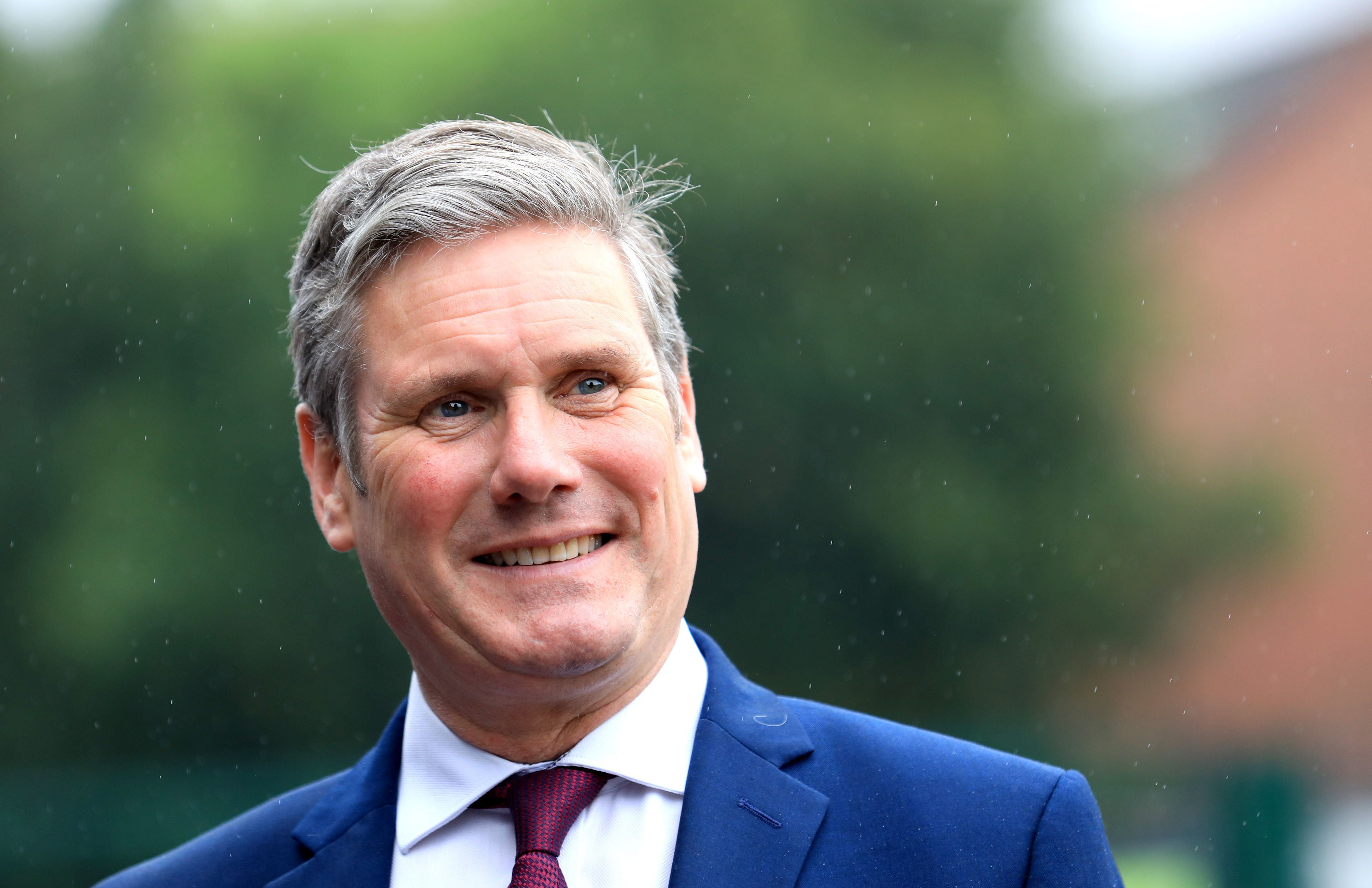Labour needs a complete rebrand, simply rearranging the deckchairs is not enough
If we look different, voters may look differently at us and this will transform our party and its electoral prospects. More of the same won’t produce the large swing in support needed


The Labour Party has lost four general elections in a row. The last, in 2019, handed the Conservatives their largest governing majority since Margaret Thatcher was prime minister in the late 1980s. Any pathway back to power faces an enormous uphill battle. If this was easy to overturn, it might have happened by now. This daunting reality must be in the frame when reflecting on how Labour’s fortunes can and should be improved.
We are not in normal times either, and obviously so. Leadership contests tend to end in a public celebration of supporters with live crowds on live television. Yet as the contest was ending, the pandemic and a national lockdown ushered in. I remember the time well, as it was my last trip outside the northeast to meet with Keir Starmer at his Vauxhall headquarters, during his campaign. His journey to becoming leader was not ordinary. Gone were the cheering supporters and images of happy faces standing behind a new team and making a fresh start.
Since the last general election, there have been a wide range of views about what steps Labour must take to win back power. Much of this rests on overly simplistic claims about which one thing will make all the difference.
One view is the problem can be solved by new faces – with a few going as far as wanting another leadership contest. There have been changes afoot with a reshuffle in Starmer’s top team, most notably on comms and political strategy. (I’m especially pleased to see my first student, Luke Sullivan, named political director. He’s one of the very best I’ve taught and an outstanding appointment.)
But simply rearranging the deckchairs won’t magically prove a game-changer by itself. Others say it’s not so much the people, but the policies and a more radical set at that usually echoing what was already put before voters without success in 2019 or going back to Blue Labour (which didn’t win either) is the way to win moving forward. Yet this neglects concerns about how Labour policymaking can pack a better punch – less can be more – and more of the same won’t produce the large swing in support needed. Or the answer is having more members, when a party with far fewer has won several general elections in a row against us. Finally, another view is Labour should turn up the volume, and be more vocal about its opposing the government.
But the public is generally turned off by shouting matches and what wins over is not simply disagreement, but a positive vision. It’s not so much opposing as proposing that is key. The success by Kim Leadbeater in Batley and Spen for Labour is one example of running a campaign about what this will do and not merely what it won’t.
These suggestions share a common thread about the need for Labour’s sharpening its distinctiveness and the message of change we offer, a recurring theme in findings from a new party strategic review. I want to raise a few next steps on how this might be actually achieved.
David Cameron did not become prime minister because he changed his party’s logo, but the new look set a clear, discernible marker that he was offering a refreshed party. The rebranding helped to send that message. It was a symbol that the Tories were under new management. While many criticised the move from Thatcher’s freedom torch to his crayon coloured oak tree, Conservatives won four elections in a row under this banner.
In contrast, it has been decades since Labour underwent any similar exercise. It’s time to rethink our image to help highlight our moving forward. If we look different, voters may look differently at us and this would be a welcome first step in transforming our party and its electoral prospects. It might be considered whether a new image, coloured a familiar dominant red, laced with white and blue would more visibly communicate the “stronger together” vision for Britain. No doubt this would begin to get more talking about the forward direction Labour is moving in which can only help.
The next step is to follow this new look with a cross-cutting new message in line with calls for tighter message discipline. I’d push for “competence with compassion” – which we’re already seeing in Labour’s statements on immigration matters – permeating every sentence in every interview or press release. It should be repeated so often it creates a kind of political hypnosis making people say it in their sleep.
These are two clear divides that can define our success sharply distinguishing the Conservatives from Labour. Incompetence runs deep through this government like a festering rot. We need to remain laser-like in our exposing the ever-increasing litany of dithering, delays and failures from this government, but be more attentive to communicating clearly how we would be decisive and create better outcomes. Nobody will think we’re ready for government if we only show them that the Tories aren’t fit for office. We need to earn the public’s trust in our greater competence. Again, it’s not just about what we oppose, but what we propose in its place. We win when our positive vision has public support.
The second clear divide is compassion. Every soundbite and message from across our party must be clearer that we are on the public’s side and we can understand their hopes and fears. It’s no good saying we’re with the many if the most vote for others. We need more empathetic engagement, and there’s lots of evidence from the front bench on issues like violence against women and girls or Windrush, among many other examples, that this connects with our fundamental Labour values and represents a clear divide between the Tories and us, and is gaining cut through.
But a new look and message only address more surface-level steps in Labour’s pathway back to power. At its heart is our vision and the policies that are part of it. So those who say policies matters enormously are right, but I’d argue we should focus more on improving the process of policy-making and promotion of policy outcomes.
Hopefully, we’ll all be back together again for our annual conference. This is a hugely important event for members coming together and policy discussions, but we must build on this. We might improve how this is managed, but a substantive message of change must go deeper and convincingly so.
People want to come together and share ideas, but they also want to feel included. While many may wish to do so in person, technology has made it possible for hybrid meetings to become more commonplace, too, which should be exploited to make events more accessible.
One early commitment should be setting a timetable for regional conferences across every part of the country, and outside London. I’m happy to volunteer to play host in the northeast to help get this started. This will help re-energise our membership, revitalise CLPs and their working together, and create more welcome opportunities for all to contribute – and feel more included.
Labour benefits from the expertise of a wide range of academic experts, such as in the Labour Academic Network that I lead, and experiences of many more from work. The party should include in its policy forming committees additional seats at the table for these voices. This will support a more thorough vetting of ideas. We have a wealth of talent that has too few opportunities to engage. Leafletting and phone banks are not nearly enough. We can and should make more use of the talents of our membership – and expand beyond anything like what we’ve done before. Better utilising our expertise and experience in policy development alongside a more active regionally informed consultation would help bring out the best in our party.
There is no quick fix to returning Labour to power. The steps above are only the first part of a longer journey. But, finally, we must recognise that we’re all in this together. When Labour wins, we all win – and when we lose, we all lose. It does not help our future prospects in any positive direction if we are not working together as a team.
And we have an extraordinary asset in our leader, Keir Starmer. When the worst smear the right-wing press can come up with is that he’s been knighted for his outstanding public service as director of public prosecutions or that he gets everything right but only in hindsight, things can only get better from here. His competence and compassion throughout his career is a personal testament to the virtues of competence and compassion that run through our party – and a further reason why they should be a mantra through to the next general election.
Our party is a broad tent and this is a strength. Our members are passionate, which is why so many feel so strongly about how we can best secure a future government – this is also a strength. All parts of our party must rally behind it. A wider, regionally-informed approach to policymaking that makes better use of our members’ insights and experiences is something all parts of our party can stand firmly behind.
We must also look the part of a government in waiting rather than a perpetual opposition. A new look and message are crucial for making this change in tone and style visible, backed up by the credible substance of a more thorough and engaged policy forming process. Our work is only beginning – and we have a mountain to climb – but under Starmer and with our members working together another future is possible if we’re willing to fight for it.
Starmer’s team is playing to win, rebuilding strategically and knowing Rome wasn’t built in a day as we prepare for an election on the near horizon. A new look and message alongside a more visible and engaged platform are the next vital steps towards returning Labour to power.
Thom Brooks is director of the Labour Academic Network and professor of law and government at Durham University
Join our commenting forum
Join thought-provoking conversations, follow other Independent readers and see their replies
Comments